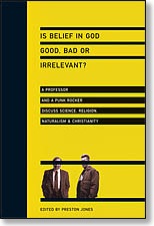Is Belief in God Good, Bad or Irrelevant?
08/28/2006 13:45 Filed in: Books & Literature

I've read lots of "conversations" between Christians and non-Christians, but I was always troubled that the Christian in the books was so easily able to destroy the arguments of the skeptic as this never seemed to work quite so easily for me in real life. The problem is that in the books, such conversations are usually made up, and of course, the Christian gets the edge. That's not the case with the conversation between Preston Jones and Greg Graffin in the new book Is Belief in God Good, Bad or Irrelevant? from InterVarsity Press.
In this book, we get to read a read another person's email--in fact the email of two people--and it's perfectly okay. The book is described as "A Christian and a naturalist in conversation," and that's exactly what it is. What makes the book so interesting is who these two people are. Representing Christianity is Preston Jones who is a professor of history at John Brown University in Siloam Springs, Arkansas. His naturalist counterpart is Greg Graffin. Now if Graffin's name sounds vaguely familiar to you, it's because he's lead singer of Bad Religion, a punk group whose lyrics tend to be not just anti-Christian, but anti-religion in general. What I didn't know about Graffin until this book is that he has a Ph.D in evolutionary paleontology from Cornell University. Yes, you read that correctly. His dissertation was titled, "Monism, Atheism and the Naturalist Worldview: Perspectives from Evolutionary Biology."
Jones' and Graffin's email correspondence makes for very thought-provoking reading. The book is not a primer in evangelizing the lost as some may be tempted to think, but rather an open-ended dialogue between one person who sees value in religion and another person who doesn't. Neither is converted to the other's opinion by the end of the book, but it is the conversation itself that is of most value.
I should also point out that although Jones initiated the conversation, his writing never makes Graffin come across as an evangelism project. In fact, Jones was a fan of Bad Religion from its very early days in the early 1980's. Since Jones genuinely appreciated the honesty of Graffin's music, his impulse one day to send Graffin an email was done with the utmost respect for the man.
What is contained in the book is an extended conversation that takes place over a a period months, mostly in 2003. While the messages are kept in chronological order, certain themes emerge that form the sections of the book. This won't seem unusual to you if you've ever kept a long-running conversation going with someone through any means of correspondence. Although the conversation is forward going, the topics wax and wane. This is certainly true for this book. The table of contents list a number of conversations including the following: religious inquisitions, hating God, theism vs. naturalism, foundations for morality, the Fall, free will (Graffin does not believe in free will of any kind), Christianity and violence, and proximate vs. ultimate meaning. Other topics are covered as well.
The book also contains a series of intelligent study guides. I call them "intelligent" because these guides are not afraid to ask hard questions regardless of whether one is a theist or naturalist. Further, each study guide comes with research questions which will take a fair amount of preparation on the part of the participants. This is definitely not designed for a "show up and talk about it" group.
The book is a good "get out of your comfort zone" read. As I said, neither person converted the other to his point of view, but I have no doubt the conversation may be ongoing. What is of value is that certain stereotypes about the other's position may by have been dismantled for both participants. Surely Graffin came to realize in his discussions with Jones that there actually are intelligent Christians out there who can hold legitimate conversations about faith, biology, and naturalism. And no doubt Jones was stretched by Graffin as many of his arguments were countered one-by-one.
If there is any evangelistic value to this book, it is to show that to gain an audience with some non-believers, one has to show genuine respect and be willing to communicate openly, honestly and (most importantly) intelligently over the long haul. There is no room for hit and run, cold-turkey evangelism with someone like Graffin. Those are the kind of folks he philosophically and intellectually eats for breakfast.









